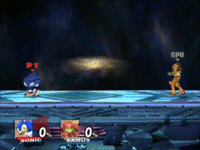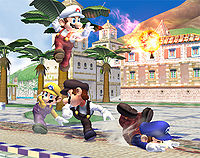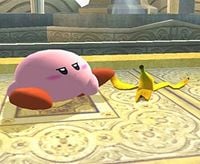Tripping: Difference between revisions
Omega Tyrant (talk | contribs) mNo edit summary |
mNo edit summary |
||
| Line 7: | Line 7: | ||
While sitting down, a character has the same [[Floor Recovery|options]] as if they are lying down. However, a tripped character is in a more vulnerable position than a lying down character. Attacks from a sitting position are weaker than attacks from a lying down position, usually dealing 5% as opposed to 6% and lacking [[transcendent priority]], and the character is only [[invincible|safe]] for 8 [[frame]]s (attacking while lying down usually keeps the character safe until the attack's hitboxes end). The other options are generally subpar as well, having fewer invincibility frames yet comparably long animations. Additionally, sitting opponents can be [[grab]]bed unlike lying down opponents. | While sitting down, a character has the same [[Floor Recovery|options]] as if they are lying down. However, a tripped character is in a more vulnerable position than a lying down character. Attacks from a sitting position are weaker than attacks from a lying down position, usually dealing 5% as opposed to 6% and lacking [[transcendent priority]], and the character is only [[invincible|safe]] for 8 [[frame]]s (attacking while lying down usually keeps the character safe until the attack's hitboxes end). The other options are generally subpar as well, having fewer invincibility frames yet comparably long animations. Additionally, sitting opponents can be [[grab]]bed unlike lying down opponents. | ||
In an interview with Kotaku, [[Masahiro Sakurai]] confirmed that tripping would not return in ''[[Super Smash Bros. 4]]''.<ref>[http://kotaku.com/no-more-tripping-in-the-new-smash-bros-513187770 Kotaku: No More Tripping In The New Smash Bros]</ref> It was unclear at the time if he was referring to just random tripping or forced tripping as well, though a later snapshot of [ | In an interview with Kotaku, [[Masahiro Sakurai]] confirmed that tripping would not return in ''[[Super Smash Bros. 4]]''.<ref>[http://kotaku.com/no-more-tripping-in-the-new-smash-bros-513187770 Kotaku: No More Tripping In The New Smash Bros]</ref> It was unclear at the time if he was referring to just random tripping or forced tripping as well, though a later snapshot of [[:File:SSB4_-_Diddy_Kong_Screen-10.jpg|Fox tripping over a banana peel]] confirmed forced tripping will return. | ||
{{clear}} | {{clear}} | ||
Revision as of 05:04, February 21, 2014
Tripping (officially called prat falling; referred to in game files as slipping) is a gameplay mechanic introduced in Super Smash Bros. Brawl. Whenever a character begins to dash or turn while running, there is a very small chance that the character will trip, fall over, and sit down in a prone state with a confused expression. While apparently intended to stop excessive dashing and pivoting, characters can also trip when they intend to use a forward smash or side special move with the control stick. A character can also be tripped from getting hit by certain attacks and items. The game keeps track of the total number of Prat Falls each character or name has experienced in Group Brawls.
Interestingly, the sound effect for tripping (when not induced by an opponent or item) changes depending on whether the character tripping is from a cartoon-ish or realistic universe: the realistic characters make unimpressive falling-down noises, while cartoon-ish characters (that is, most of the cast) make a distinctive timpani noise. The 'slip' sound effect for realistic characters (and some cartoon-ish characters) make a light, quick woosh sound, while most of the cartoon-ish characters make a swabbing noise like a sliding mop.
While sitting down, a character has the same options as if they are lying down. However, a tripped character is in a more vulnerable position than a lying down character. Attacks from a sitting position are weaker than attacks from a lying down position, usually dealing 5% as opposed to 6% and lacking transcendent priority, and the character is only safe for 8 frames (attacking while lying down usually keeps the character safe until the attack's hitboxes end). The other options are generally subpar as well, having fewer invincibility frames yet comparably long animations. Additionally, sitting opponents can be grabbed unlike lying down opponents.
In an interview with Kotaku, Masahiro Sakurai confirmed that tripping would not return in Super Smash Bros. 4.[1] It was unclear at the time if he was referring to just random tripping or forced tripping as well, though a later snapshot of Fox tripping over a banana peel confirmed forced tripping will return.
Causes of tripping

- Whenever the control stick is smashed left or right, whether from inputting a dash or an attack, there is a 1% chance for the player to trip.
- Surfaces with a lack of traction (such as ice) have a higher likelihood of causing tripping.
- Getting hit with certain attacks (most down tilts and other low attacks are designed to trip opponents).
- In addition, if an attack hits targets at a low angle (such as the Sakurai angle) and the target does not leave the ground from the knockback, there is an additional chance to trip.
- Being hit with/stepping on a Banana Peel.
- When Tingle rains down banana peels (note these are 2D sprites, not actual Banana Peels), it causes constant tripping to all opponents until he leaves the screen.
- Luigi's Negative Zone can cause incessant tripping.
List of tripping attacks
Most attacks can only make an opponent trip if their target does not leave the ground from the attack's knockback, and is not already in a sitting down state. However, some have the slip effect and will therefore result in a trip regardless of these circumstances; these are represented in this list with "Always".
| Attack | Trip chance | |
|---|---|---|
| Mario | Down tilt | 40% |
| Cape | 30% | |
| Luigi | Down tilt | 35% |
| Dash attack (last hit) | 30% | |
| Negative Zone | Unknown | |
| Peach | Down tilt | 30% |
| Down smash | 20% | |
| Bowser | Forward tilt (angled down) | 40% |
| Down tilt | 30% | |
| Giga Bowser | Forward tilt (angled side) | 50% |
| Forward tilt (angled down) | 100% | |
| Up tilt | 50% | |
| Yoshi | Down tilt (clean) | 30% |
| Down tilt (tip) | 40% | |
| Wario | Down tilt | 40% |
| Down smash (before frame 32) | 30% | |
| Wario Waft (uncharged) | Always | |
| Donkey Kong | Forward tilt (angled down) | 15% |
| Down tilt | 40% | |
| Link | Down tilt | 40% |
| Down smash | 30% | |
| Toon Link | Down tilt | 40% |
| Dash attack | 30% | |
| Down smash | 30% | |
| Neutral air | 30% | |
| Zelda | Down tilt | 40% |
| Down smash | 30% | |
| Sheik | Down tilt | 40% |
| Down smash | 40% (hit 1) 30% (hits 2-3) | |
| Ganondorf | Down tilt | 35% |
| Samus | Down tilt | 40% |
| Down smash | 30% | |
| Zero Suit Samus | Forward tilt | 20% (angled side) 60% (angled down) |
| Down tilt | 40% | |
| Down smash | 30% | |
| Kirby | Down tilt | 35% (foot) 30% (toe) |
| Meta Knight | Down tilt | 30% |
| King Dedede | Neutral attack (hit 2) | 20% |
| Down tilt | 40% | |
| Back aerial | 30% | |
| Fox | Down tilt | 40% |
| Down smash | 35% | |
| Falco | Down tilt | 40% |
| Down smash | 40% | |
| Reflector | 40% | |
| Wolf | Down tilt | 40% |
| Forward smash (rear segment) | 60% | |
| Down smash | 35% | |
| Up air | 35% | |
| Blaster | 40% (claw front) 37% (claw back) | |
| Pikachu | Neutral attack | 10% |
| Down tilt | 30% | |
| Down smash (last hit) | 30% | |
| Skull Bash | 30% | |
| Ness | Down tilt | 30% |
| Lucas | Down tilt | 40% |
| Mr. Game & Watch | Judge #2 | 20% |
| Diddy Kong | Banana Peel | Always |
| Item | Banana Peel | Always |
*Copy abilities not mentioned are the same as their originals.
Controversy
Random tripping is one of the more, if not the most, controversial additions to Brawl, being a gameplay mechanic that is universally panned by competitive players and disliked even by many casual ones.
Random tripping is seen as an annoyance in general, as it can suddenly interrupt a player's action whenever they input a dash, to no fault of their own, while leaving them in a vulnerable position. This has a large potential to impact a match however beyond simple annoyance. As tripping leaves the player in a significant state of vulnerability while moving them a small distance forward, it is a common occurrence for players to trip into an opponent's attack they would have otherwise not get hit by, which can be as minor as a one hit inconsequential punish, or the tripping player getting KO'd prematurely and even losing the match to an event that was not in their control. It works in the reverse too, where a player going to punish an opponent's vulnerability trips, preventing them from hitting the opponent with their attack that would otherwise land. This can merely save the opponent from a one-hit inconsequential punish, or save their stock and delay victory, or even give the opponent a chance to come back and win a match they should have otherwise lost. There is also the rarer occurrence of a player reading the opponent's movement/action and inputting an attack that will punish them, but then the opponent trips, halting their action while keeping them out of the reach of the player's attack, saving them from the player's punish that should have hit them.
Random tripping has been cited by many players as an unnecessary and detrimental addition to the game, as it not only adds nothing worthwhile to the game in their view, but introduces a constant element of chance that not only disrupts gameplay and annoys players, but has the capability to give a player the chance to win by being luckier than their opponent despite being the worse player. Random tripping is also said to harm the metagame of Brawl, as it cannot be used as part of any strategy, since it is impossible to predict consistently enough.
While random tripping is generally considered a detriment to tournament play, forced tripping is generally seen as acceptable and is looked upon much more favorably. Unlike random tripping, it does not interrupt a player's input, while giving players the ability to control inflicting it on the opponent. And since the players are in control of inducing it, strategies can be built around it. Forced tripping is an integral part of some characters' metagames; this is especially true for Diddy Kong and his Banana Peels, which is among the strongest reasons for his top-tier placement.
Because it is universally disliked amongst the community, random tripping is usually removed in fan-made edits of Brawl, with the four major Brawl mods - Brawl+, Brawl Minus, Balanced Brawl, and Project M - each removing it. Forced tripping from items and attacks, however, are retained in each. Masahiro Sakurai, the lead developer of Brawl, has become somewhat infamous for adding random tripping into the game, and references to Sakurai are commonly made when a trip results in significant consequences.
Trivia
- The Super Smash Bros. Melee bonus, Pratfaller, does not have anything to do with Brawl's "prat falling". Instead, it is awarded if a character always lands face up after tumbling.
- If a Fighting Alloy is hacked into a normal match and loses, their losing animation is their sitting pose.
- Tripping was first discovered during the Brawl demo at E for All. It was not recognized as being random at the time, leading to some players trying to learn how to trigger it at will for use as a technique. For a time it was known as Ink Dropping, as noted in Gimpyfish's famous SWF thread.


